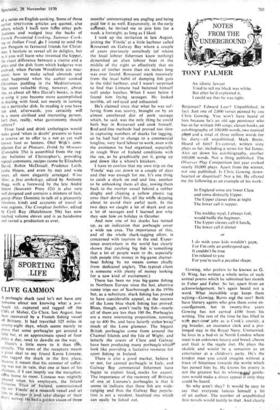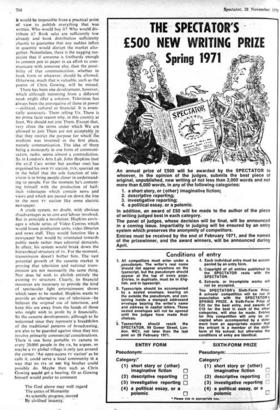TONY PALMER
An idiotic lawyer Tried to tell me black was white. But after he'd explained it, I could see that he was right.
Betjeman? Edward Lear? Unpublished, in fact. Just one of 2,000 verses penned by cne Chris Gowing. You won't have heard of him because he's an old age pensioner who has so far written 100 songs, eleven books, an autobiography of 100,000 words, two musical plryll and a total of three million words for his diary—all unpublished.. Mark Burns. Heard of him? Ex-convict, written sixty plays so far, including a series for Sid James. Also set down his autobiography, another 100,000 words. Not a thing published. The Observer Play Competition last year evoked nearly 10,000 plays. Apart from the winner, not one published. Is Chris Gowing down- hearted or dispirited? Not a bit. He offered me the following as an example of his work:
In England some are lower Class and some distinctly Upper. The Upper classes dine at night The lower call it supper.
The midday meal, I always feel, would baffle the beginner.
The Upper classes call it lunch, The lower call it dinner or I do wish your kids wouldn't gape, - For I'm only an anthropoid ape.
It couldn't be true I'm related to you For you're such a peculiar shape.
Gowing, who prefers to be known as G. 0. Wing, has written a whole series of such animal poems which he submitted last month to Faber and Faber. So far, apart from an acknowledgement, he'S again heard not a word. What incredible urge keeps them wiiting----Gowing, Burns aqii the rest? Both have literary agents who give them some en- courigernent, but in twenty-five years Gowing has not earned £100 from his writing. The rest of the time he has filled in witft part-time jobs as a- Cook's courier, a pig breeder, an insurance clerk and a pro- longed stay in the Royal Navy. Unmarried, he lives in a bed-sit in North' London where meat is an unknown luxury and bread, cheese and fruit is the staple diet. He plays the ukulele and would be a sensation as an entertainer at a children's party. He's the kindest man you- could imagine without a trace of bitterness towards the world which has passed him by. He knows his poetry is not the greatest but its whims gentle- ness would make a direct appealrittly they could. be heard.
So why aren't they? It would be easy to say' that everyone fancies himself a bit of an author. -The number of unpublished first novels would testify to that. And clearly
it would be impossible from a practical point of view to publish everything that was. written. Who would buy it? Who would dis- tribute it? Book sales are sufficiently low already and book distribution sufficiently chaotic to guarantee that any sudden influx in quantity would disrupt the market alto- gether. Nonetheless, there is the nagging sus- picion that if someone is foolhardy enough to commit pen to paper in an effort to com- municate with someone else, then the possi- bility of that communication, whether in book form or whatever, should be allowed. Otherwise, much that is valuable, such as the poems of Chris Gowing, will be missed.
There has been one development, however, which although stemming from a different need, might offer a solution. Television has always been the prerogative of those in power —political, cultural or financial. It is essen- tially autocratic. Them telling Us. There is no prima facie reason why, in this country at least, We should not join Them. Except that, very often the terms under which We are allowed to join Them are not acceptable in that they restrict the purpose for which the medium was invented in the first place, namely communication. The idea of there being a monopoly in one form of communi- cation, radio, seems almost a contradiction. So in London's Arts Lab, John Hopkins (not the ex-Z Cars writer but another one) has organised his own Tv station, Tvx, spurred on in the belief that the sole function of tele- vision is to bring people closer in understand- ing to people. For the moment he's content- ing himself with the production of half- inch videotapes which contain news and views and which are passed on down the line to the next Tv station like some electric newspaper.
A crude system, no doubt, with obvious disadvantages as to cost and labour involved. But in principle a revolution. Hopkins envis- ages a whole series of Video Centres which would house production units, video libraries and news staff. They would function like a newspaper but would be orientated towards public needs rather than editorial demands. In effect, his system would break down the hierarchical structure of Tv. For the moment, transmission doesn't bother him. The vast potential growth of the cassette market is proving that television and national trans- mission are not necessarily the same thing. Nor does he wish to abolish entirely the existing Tv structure. Clearly, its financial resources are necessary to provide the kind of spectacular light entertainment shows which seem to be needed. Hopkins wants to provide an alternative use of television—he believes the original use of television, and keep this use away from the hands of those who might wish to profit by it financially. So the cassette developments, although to be welcomed since they represent -a breakdoivn of the traditional patterns of broadcasting, are also to be guarded against since they too involve primarily commercial considerations. There is one Sony portable Tv camera to every 20,000 people in the us, he argues, so maybe a Tv global village is only just around the corner. 'An open-access Tv station' as he calls it, could serve a local community in a way that no rrA or BBC big brother could possibly do. Maybe then such as Chris Gowing would get a hearing. Or as Gowing himself would prefer to comment
The God above may well regard The antics of Humanity As scientific progress, moved By civilised















































 Previous page
Previous page